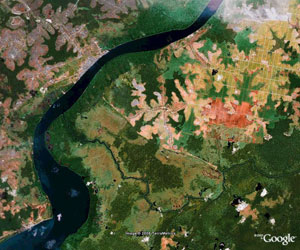10% of global CO2 emissions result from swamp destruction
10% of global CO2 emissions result from swamp destruction
Rhett A. Butler, mongabay.com
December 10, 2007
New fund will protect and restore peat swamp forests in Indonesia using proceeds from voluntary carbon offsets
More than 10 percent of annual carbon dioxide emissions result from the degradation and destruction of peat swamps, reports the first comprehensive global assessment on the links between peatland degradation and climate change.
The report, “Assessment on Peatlands, Biodiversity and Climate Change”, shows that clearance, drainage and fires in peatlands emit more than 3 billion tons of carbon dioxide every year, but that protection and restoration of peatlands are among the most cost-effective options for slowing global warming.
Peatlands, which cover 400 million hectares or 3 percent of the world’s surface, are wetland ecosystems which accumulate plant material under saturated conditions to form layers of peat soil are up to 20 meters (65 feet) thick, according to the report.
“Peatlands are the most efficient terrestrial ecosystems in storing carbon — storing up to 10 times more carbon/hectare than other ecosystems in the same region and twice as much carbon as the biomass of the world’s forests,” said the report. “Climate change impacts are already visible through the melting of permafrost peatlands and desertification of steppe peatlands. In the future, impacts of climate change on peatlands are predicted to significantly increase. Coastal, tropical and mountain peatlands are all expected to be particularly vulnerable.”
 Deforestation near Tanjung Puting in Kalimantan on the island of Borneo. Satellite image courtesy of Google Earth. |
The study, which is to be presented Tuesday, December 11 at the UNFCCC COP 13 climate talks in Bali, was implemented by Wetlands International and the Global Environment Center with the support of UN agencies and various governments.
In conjunction with the release of the report, Wetlands International and BioX Group announced a Memorandum of Understanding to jointly develop a “Global Peatland Fund” that seeks to invest in the restoration and conservation of peatland projects to help mitigate climate change. The fund will initially focus on peat swamp forests in Kalimantan and Sumatra in Indonesia, and aims to restore and protect 500,000 hectares of these peat swamps by 2012. The fund will be supported by the sale of Voluntary Emission Rights (VERs) generated by reducing carbon emissions from the degradation and destruction of peatlands.
“Wetlands International is excited by this innovative partnership with BioX Group, since it provides the opportunity to dramatically scale up the work of restoring tropical peatswamps through community-based initiatives, to benefit biodiversity and livelihoods while securing vital carbon stocks,” said Jane Madgwick, CEO of Wetlands International. “By bringing investments in for these purposes and by promoting sustainable palm oil production, BioX Group and Wetlands International will demonstrate that conservation of tropical peatlands makes strong economic sense.”
“The VERs generated by the Fund represents a high level of sustainability to the investors,” added Arjen Brinkmann, Sustainability Manager Europe of BioX Group. “Not only do these VERs guarantee greenhouse gas emission reduction, they also significantly contribute to socio-economic development in some of the poorest regions in the world, as well as the conservation of globally important biodiversity.”
Peatlands restoration is a cheap way to cut CO2 emissions
(12/7/2007) Rehabilitating damaged peatlands in Indonesia may be one of the most cost-effective ways to cut emissions of greenhouse gases, said an international NGO.
Carbon offset returns beat forest conversion for agriculture in Indonesia
(11/21/2007) Conversion of forests and peatlands for agriculture in Indonesia has generated little economic benefit while releasing substantial amounts of greenhouse gases into the atmosphere, reports a new study from the the World Agroforestry Centre (ICRAF), the Center for International Forestry Research (CIFOR) and their Indonesian partners.














